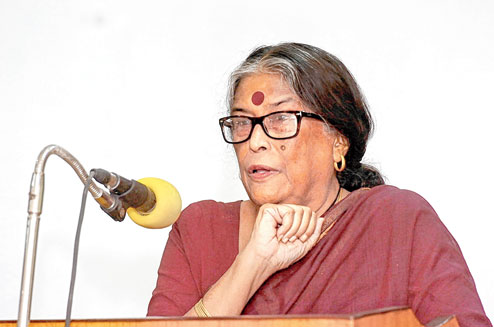 |
| Nabaneeta Dev Sen at the National Queer Conference at Jadavpur University on Friday. Picture by Sanjoy Chattopadhyaya |
An academic conference that tugs at your heart and makes a socially taboo subject more mainstream. That is the essence of the third National Queer Conference where students, scholars, activists and performers from around the country have come together to present papers and participate in the three-day consortium that started in 2009 and has been held on alternate years with Jadavpur University as its venue.
Organised by Sappho for Equality, an organisation that works on gender, sexuality and issues and rights of the LGBT community, the first chapter was titled “Queer thoughts”, the second one was “Non-normative activity, nevertheless” and this year’s conference that started on Friday is about gender-sexuality.
“Every activism should have a theoretical back-up. We’re also trying to bridge the queer and non-queer parts of society and involve the youth,” explained Subhagata Ghosh, the chief co-ordinator for Sappho.
Participants mostly comprise young Phd scholars and MPhil researchers as well as professors.
“I don’t like the word ‘queer’, you know. But it has nothing to do with the people who call themselves queer because a very wide range of people come into that definition,” said author Nabaneeta Dev Sen, who launched a Bengali FAQ book on gender and sexuality.
“I’ve seen so many young boys and girls suffer so much because they cannot tell their parents. There has to be a way of sharing and making your family acknowledge you as you are. In this world anything becomes easily acceptable when explained,” she added.
Thirty-four authors will present 26 papers over three days, for which more than 100 have registered their participation.
“This year we had a tough time selecting papers. We also got papers from Bangladesh, Nepal and Peru,” said Subhagata. “It is extremely encouraging to see participation from a large non-queer section who are feeling the urge to learn more about sexuality as a necessity for their own existence as well.”
The presentations vary from theoretical analyses of womanhood, the trap of patriarchy to current themes such as the Pink Chaddi campaign and intersection of sports, gender and sexuality and even performing arts with a queer bent.
If Gopishankar from the American College in Madurai put forth the Tamil perspective of gender and sexuality, Sumathy Murthy from Bangalore, a Hindusthani classical vocalist who has been researching the role of gender and caste in the art she practises, is here for a “vocal music-based presentation”.
“The unique thing about this conference is that it’s not where you just come, speak and walk away but one that tugs at your heart,” smiled Sumathy.
Gopishankar said he was drawn by the “post-modern and theoretical” nature of the event. “Unlike other awareness programmes this one is very educative. When something carries an intellectual element, it automatically enters the social and academic plot and the mainstream,” he added.
The conference featuring participants from institutes including Jadavpur University, St. Xavier’s College, Ahmedabad, Banaras Hindu University, Varanasi, Jawaharlal Nehru University, Swami Shraddhanand College, Jamia Millia Islamia and Ambedkar University of Delhi and Tata Institute of Social Sciences, Mumbai, will be on till Sunday.










